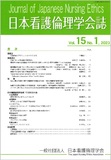Japanese
English
- 販売していません
- Abstract 文献概要
- 参考文献 Reference
- サイト内被引用 Cited by
This article aims to present what constitutes ‘not-good nursing' by analyzing firsthand accounts of the experiences of 16 Taiwanese cancer patients as part of the Good Nurse International Collaborative Research Project. The author wishes to discuss the significance of this particular research project from the perspective of logotherapy, developed by the Austrian neurologist and psychiatrist, Viktor Frankl (1905-1997). The characteristics of ‘not-good nursing’ were perceived and articulated by the participants in the following five ways: (a) Being professionally unreliable; (b) Being rigid; (c) Being rude; (d) Behaving like a ‘step-mother’; (e) Being callous. The characteristics clearly demonstrate that the ethical dimension of nursing has become less prominent in this technology-driven era. We can, perhaps, from a historical and social perspective, understand that the concept of ‘not-good nursing’ is the result of a kind of an ‘attitude of living from day to day without any plan’, ‘a fatalist mindset’ in the era of nihilism, or a ‘loss of meaning’, as described by Frankl. The firsthand accounts of patients recorded in this study will be valuable as teaching materials in nursing education, nursing practice, and research. The hope is that the ‘conscience’ of a nurse can be ‘re-awakened’.
This article aims to present what constitutes ‘not-good nursing' by analyzing firsthand accounts of the experiences of 16 Taiwanese cancer patients as part of the Good Nurse International Collaborative Research Project. The author wishes to discuss the significance of this particular research project from the perspective of logotherapy, developed by the Austrian neurologist and psychiatrist, Viktor Frankl (1905-1997). The characteristics of ‘not-good nursing’ were perceived and articulated by the participants in the following five ways: (a) Being professionally unreliable; (b) Being rigid; (c) Being rude; (d) Behaving like a ‘step-mother’; (e) Being callous. The characteristics clearly demonstrate that the ethical dimension of nursing has become less prominent in this technology-driven era. We can, perhaps, from a historical and social perspective, understand that the concept of ‘not-good nursing’ is the result of a kind of an ‘attitude of living from day to day without any plan’, ‘a fatalist mindset’ in the era of nihilism, or a ‘loss of meaning’, as described by Frankl. The firsthand accounts of patients recorded in this study will be valuable as teaching materials in nursing education, nursing practice, and research. The hope is that the ‘conscience’ of a nurse can be ‘re-awakened’.
Copyright © 2023, The Japan Nursing Ethics Associatin. All rights reserved.


